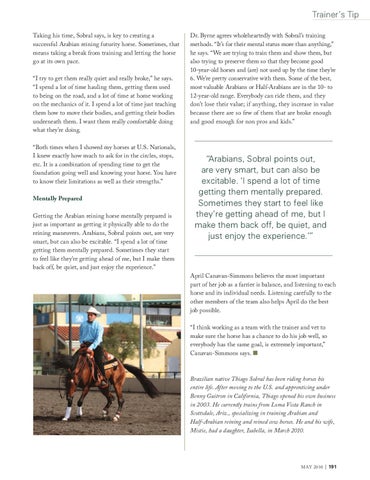Trainer’s Tip Taking his time, Sobral says, is key to creating a successful Arabian reining futurity horse. Sometimes, that means taking a break from training and letting the horse go at its own pace. “I try to get them really quiet and really broke,” he says. “I spend a lot of time hauling them, getting them used to being on the road, and a lot of time at home working on the mechanics of it. I spend a lot of time just teaching them how to move their bodies, and getting their bodies underneath them. I want them really comfortable doing what they’re doing. “Both times when I showed my horses at U.S. Nationals, I knew exactly how much to ask for in the circles, stops, etc. It is a combination of spending time to get the foundation going well and knowing your horse. You have to know their limitations as well as their strengths.” Mentally Prepared Getting the Arabian reining horse mentally prepared is just as important as getting it physically able to do the reining maneuvers. Arabians, Sobral points out, are very smart, but can also be excitable. “I spend a lot of time getting them mentally prepared. Sometimes they start to feel like they’re getting ahead of me, but I make them back off, be quiet, and just enjoy the experience.”
Dr. Byrne agrees wholeheartedly with Sobral’s training methods. “It’s for their mental status more than anything,” he says. “We are trying to train them and show them, but also trying to preserve them so that they become good 10-year-old horses and (are) not used up by the time they’re 6. We’re pretty conservative with them. Some of the best, most valuable Arabians or Half-Arabians are in the 10- to 12-year-old range. Everybody can ride them, and they don’t lose their value; if anything, they increase in value because there are so few of them that are broke enough and good enough for non pros and kids.”
“Arabians, Sobral points out, are very smart, but can also be excitable. ‘I spend a lot of time getting them mentally prepared. Sometimes they start to feel like they’re getting ahead of me, but I make them back off, be quiet, and just enjoy the experience.’”
April Canavan-Simmons believes the most important part of her job as a farrier is balance, and listening to each horse and its individual needs. Listening carefully to the other members of the team also helps April do the best job possible. “I think working as a team with the trainer and vet to make sure the horse has a chance to do his job well, so everybody has the same goal, is extremely important,” Canavan-Simmons says. ■
Brazilian native Thiago Sobral has been riding horses his entire life. After moving to the U.S. and apprenticing under Benny Guitron in California, Thiago opened his own business in 2003. He currently trains from Loma Vista Ranch in Scottsdale, Ariz., specializing in training Arabian and Half-Arabian reining and reined cow horses. He and his wife, Mistie, had a daughter, Isabella, in March 2010.
M AY 2010 | 191
